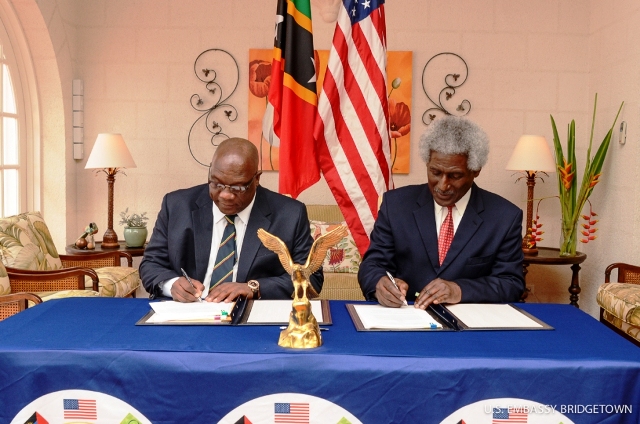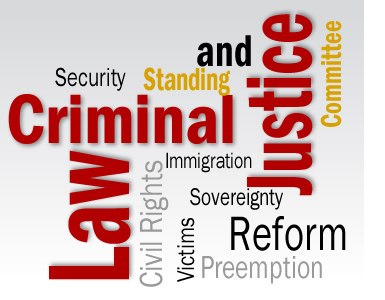Photo: St. Kitts and Nevis’ Prime Minister and Minister of Finance, Dr. the Hon. Timothy Harris (left) signs FACTA agreement with the United States Ambassador to St. Kitts and Nevis, His Excellency Larry S. Palmer .
BASSETERRE, ST. KITTS, March 28th 2017 – The Federation of St. Kitts and Nevis is susceptible to corruption and money laundering because of the high volume of narcotics trafficking around the islands.
The United States Department of State Money Laundering Assessment Report deemed St. Kitts and Nevis a Jurisdiction of Concern.
The 2017 International Narcotics Control Strategy Report on Money Laundering and Financial Crimes state that the growth of the offshore sector in St. Kitts and Nevis coupled with unusually strong secrecy laws also remains problematic.
The Report, which is widely circulated regionally and internationally states: “St. Kitts and Nevis derives a significant portion of its revenue from its program offering citizenship through investment (CIP); however, this program’s prior lax vetting created AML and security vulnerabilities domestically and internationally.”
“Despite recent efforts to improve the application process and vetting procedures, the CIP continues to be afflicted by significant deficiencies in vetting candidates and conducting due diligence on passport and citizenship recipients after they receive citizenship,” noting that an individual is eligible for economic citizenship with a US$400,000 minimum investment in real estate. Also, an applicant is eligible by making a contribution ranging from $250,000 to $356,000 (based on an application for two adults and two dependents) to the Sugar Industry Diversification Foundation, a special project approved for the purpose of citizenship by investment.
Applicants must make a source of funds declaration and provide evidence supporting the declaration. The Ministry of Finance has established a Citizenship Processing Unit to manage the screening and application process.
It said the AML legislation is at the federation level and covers both St. Kitts and Nevis.
It further noted that each island has the authority to organize its own financial structure and procedures, pointing out that St. Kitts has acts governing companies, limited partnerships, foundations, and trusts that are registered in St. Kitts, while Nevis has Ordinances that govern corporations, limited liability companies, trusts, and multiform foundations. Most of the offshore financial activity is concentrated in Nevis.
“There is a limited amount of information on the exact number of financial entities in the federation. In 2010, St. Kitts had licensed approximately 36 corporate service providers, three trust providers, 116 captive insurance companies, and over 2,100 companies and foundations. Nevis had over 11,000 IBCs, 4,200 limited liability companies, over 1,000 trusts, and over 110 insurance companies. Nevis can form an IBC in less than 24 hours, and bearer shares are allowed though “discouraged.” Internet gaming entities must apply for a license as an IBC,” said the Report.
It added that St. Kitts and Nevis did not report passage of new enforcement legislation or prosecutions in 2016, and there have been no money laundering prosecutions or convictions since 2013.
“There are no guidelines to provide law enforcement the authority to conduct an investigation based on a foreign request for assistance. SKN’s legislation incorporates provisions for civil penalties; however, they continue to be applied in an unreliable manner and do not apply to all pertinent financial sectors. Bearer shares are authorized if the bearer share certificates are retained in the protected custody of persons or financial institutions authorized by the Minister of Finance. Specific identifying information must be maintained on bearer certificates, including the name and address of the bearer as well as the certificate’s beneficial owner,” said the Report, which further noted that financial oversight in Nevis remains problematic due to St. Kitts and Nevis allowing the creation of anonymous accounts, strong bank secrecy laws, and overall lack of transparency of beneficial ownership of legal entities.
“The ambiguous regulatory framework regarding customer due diligence makes Nevis a desirable location for criminals to conceal proceeds,” said the Report, which advised that the Government should focus on addressing these issues.
“SKN must work toward transparency and accountability in financial regulation. Specifically, it must precisely determine the exact number of internet gaming companies present on the islands and conduct the necessary oversight of these entities. The government should ensure all relevant entities covered under the AML laws and regulations are subject to sanctions that are proportionate and dissuasive. SKN should promote close supervision of the CIP and be transparent in reporting monitoring results,” the US Department of State report said.









